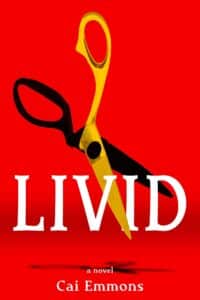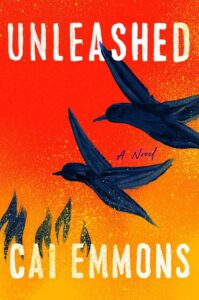My two recent novels, Unleashed and Livid—both being published in September 2022—feature female protagonists who discover their anger. They not only realize they’re angry, they put their rage into action. And while they don’t do anything sociopathic—like shoot into a crowd with an AR15—they do lash out in ways that are socially unacceptable, especially for women.
As a writer I’m interested in exploring what it means that we all, men and women alike, marinate in the daily, often invisible, soup of a culture imbued with misogyny, patriarchy, and the understanding that women are less important and less competent than men. A culture in which men are led to feel entitled, where they assume that leadership positions should go to them, where they interrupt women, demean women, and mansplain. And a culture in which women often acquiesce to these things because it seems like too much trouble to point them out and stand up for ourselves. Living this way erodes confidence and self-esteem, and anger simmers.
We don’t all express this anger, but I believe, if you scratch the surface, you’ll find it lives somewhere in most women.
In realistic fiction, as in real life, anger can obscure the nuances of a character. It’s a trait that has a tendency to take over and  make a person unpleasant to hang out with. When writing I try to ignore the oft-debated question about whether my characters are likable, but I do want them to be people my readers want to hang out with. So, in approaching both Livid and Unleashed, I was keenly aware of treading a delicate line.
make a person unpleasant to hang out with. When writing I try to ignore the oft-debated question about whether my characters are likable, but I do want them to be people my readers want to hang out with. So, in approaching both Livid and Unleashed, I was keenly aware of treading a delicate line.
Livid grew out of my rage at the SCOTUS confirmation hearing for Kavanaugh. What an angry, immature, smug person he showed himself to be! I was furious at him and furious at the people who confirmed him. What were they thinking? Sybil, the protagonist of Livid, finds herself on a jury with her ex-husband for the trial of a woman accused of killing her husband. Her anger bubbles quietly throughout the novel until it finally finds an outlet close to the end.
 Lu, the protagonist of Unleashed, is a milder character than Sybil, but when her daughter goes off to college, and the façade of her perfect marriage is stripped away, life begins to change. Things she hasn’t noticed before come to light, igniting her anger. I can’t say more without spoiling the reading experience, but I will say that neither character becomes a murderer!
Lu, the protagonist of Unleashed, is a milder character than Sybil, but when her daughter goes off to college, and the façade of her perfect marriage is stripped away, life begins to change. Things she hasn’t noticed before come to light, igniting her anger. I can’t say more without spoiling the reading experience, but I will say that neither character becomes a murderer!
As I wrote these novels, something became clear to me. Women are angrier these days than we have been for a while. We’re mad about men making decisions about our bodies. We’re mad at men acting juvenile and starting unnecessary wars to serve their own egos. We’re mad at men more generally for making so many of the laws that impact our lives negatively. Add to that the disruptive sauce of the pandemic that has deprived us of jobs and our kids of schooling, and we are often jumping out of our skins.
Thinking about this released me as a writer, making me realize my readers, my characters, and I are all in the same boat. Since I am writing neither futuristic nor historical fiction, my characters live in worlds similar to mine. They, too, absorb the cultural agitation of the moment. They, too, realize how the world at large impinges on their psyches.
It took time for me to realize what now seems so obvious: No emotion—even extreme anger—is off limits for a fiction writer. It is worth the risk of alienating a few readers in order to write honestly about the human condition.


